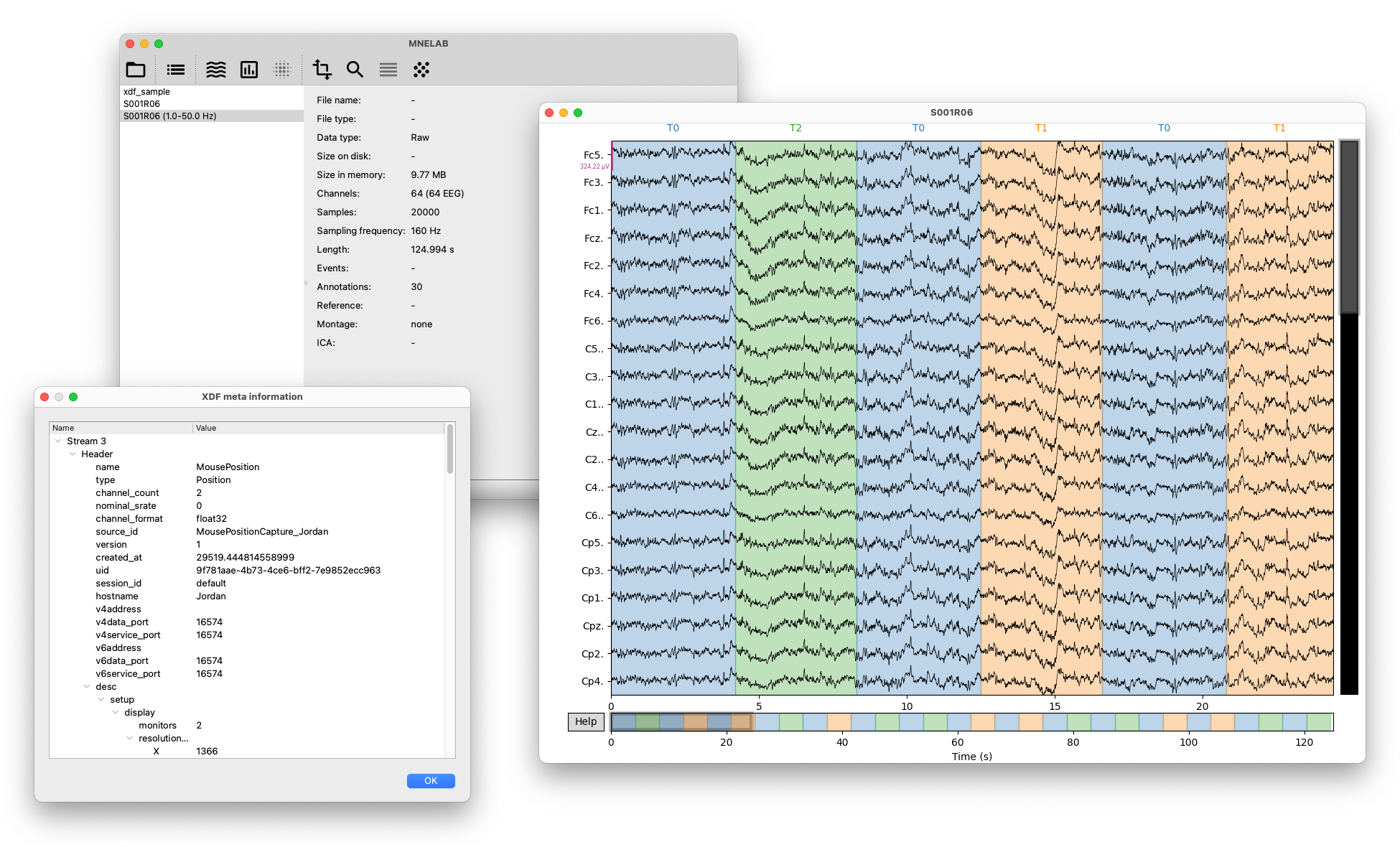A graphical user interface for MNE
Project description
Graphical user interface (GUI) for MNE, a Python-based toolbox for EEG/MEG analysis.
Dependencies
MNELAB requires Python >= 3.6. In addition, the following Python packages are required:
- PyQt5 >= 5.10.0
- numpy >= 1.14.0
- scipy >= 1.0.0
- matplotlib >= 2.0.0
- mne >= 0.17.0
- pyobjc-framework-Cocoa >= 5.2.0 (macOS only)
Optional dependencies provide additional features if installed:
- scikit-learn (ICA computation via FastICA)
- python-picard (ICA computation via PICARD)
- pyEDFlib (export to EDF/BDF)
- pyxdf (import XDF)
- pybv (export to BrainVision VHDR/VMRK/EEG)
In general, it is recommended to always use the latest package versions.
Additional features
MNELAB comes with the following features that are not (yet) available in MNE:
- Export to EDF/BDF (requires pyEDFlib)
- Export to EEGLAB SET
- Export to BrainVision VHDR/VMRK/EEG (requires pybv)
- Import XDF files (requires pyxdf)
Installation
Via pip
The latest release is available on PyPI and can be installed with:
pip install mnelab
mnelab
The mnelab command in the last line starts the application.
Via conda
An (unofficial, but regularly updated) conda package can be installed from conda-forge. We strongly suggest to install MNELAB into its own dedicated environment to ensure smooth installation and operation:
conda create -y --name mnelab -c conda-forge mnelab
conda activate mnelab
mnelab
The mnelab command in the last line starts the application. Any issues with this conda package should be reported to the respective issue tracker.
Alternatively, if for some reason you do not want to use conda-forge, you can first install all dependencies that are present in the default conda channel:
conda install pyqt numpy scipy matplotlib
Next, install the dependencies that are not in the default conda channel via pip:
pip install mne
Finally, install MNELAB as follows:
pip install --no-deps mnelab
Arch Linux
If you use Arch Linux, you can install the python-mnelab AUR package (note that this requires the python-mne AUR package).
Standalone installer
A stand-alone installer will be available soon.
Development version
Follow these steps to use the latest development version of MNELAB:
- Download the source code and unpack it into a folder of your choice.
- Open a terminal and change to the MNELAB source folder.
- Finally, run
python3 -m mnelabto start MNELAB (if this does not work trypython -m mnelab, just make sure to use Python 3 because Python 2 is not supported).
Contributing
The contributing guide contains details on how to contribute to MNELAB.
Project details
Release history Release notifications | RSS feed
Download files
Download the file for your platform. If you're not sure which to choose, learn more about installing packages.
Source Distribution
File details
Details for the file mnelab-0.5.2.tar.gz.
File metadata
- Download URL: mnelab-0.5.2.tar.gz
- Upload date:
- Size: 55.6 kB
- Tags: Source
- Uploaded using Trusted Publishing? No
- Uploaded via: twine/2.0.0 pkginfo/1.5.0.1 requests/2.22.0 setuptools/41.6.0 requests-toolbelt/0.9.1 tqdm/4.36.1 CPython/3.7.4
File hashes
| Algorithm | Hash digest | |
|---|---|---|
| SHA256 | ecc7031aa6470fd46dfb645b6c048e37a9f29adae34148fa7deceaefd3f271d6 |
|
| MD5 | 7d18b9307864434008c89a78a73f26a8 |
|
| BLAKE2b-256 | 23036cab5f269bb0e0d2ec30b480c9582a6c5917d271b02698b4ea8d79eec413 |



















